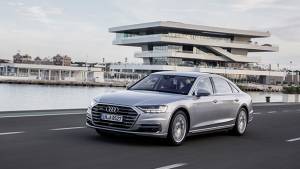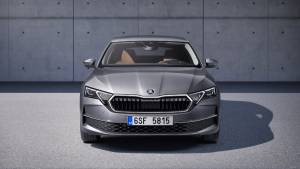2018 Audi A8L first drive review
It's interesting that Audi chose the City of Arts and Science in Valencia to give us our first hand experience of the fourth generation of their flagship model, the A8. Unveiled recently at the Frankfurt Motor Show, the new Audi flagship is a tasteful combination of art and science in that it takes the concept of autonomous driving out of the motor show floors and into the real world. There is a lot of science to it that lets the A8 gather and process information and drive by itself, while the driver can literally sit back and enjoy a sandwich, twiddle thumbs or simply relax without having to keep a hand on the wheel or feet on the pedals. By definition, that is Level 3 of autonomous driving and by the chronology of availability, the 2018 Audi A8 which goes on sale soon, is the first production car to incorporate it.
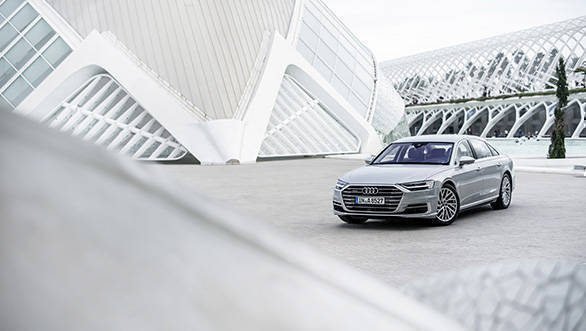 The fourth-generation Audi A8 creates headlines for being the first production car to embed Level 3 autonomous driving technologies. It also presents a new design direction for the upcoming Audi sedans with its sharper appearance and chiseled lines
The fourth-generation Audi A8 creates headlines for being the first production car to embed Level 3 autonomous driving technologies. It also presents a new design direction for the upcoming Audi sedans with its sharper appearance and chiseled lines
All the science behind this technology is being classified under the term 'Artificial Intelligence'. While AI is a part of every digital device we use today, Audi is playing big on the term to highlight the fact all it's future cars will be able to 'think' and in certain scenarios, 'decide' the reciprocal actions as well. Audi concepts like the Elaine and Aicon have not only used and stylised the letters AI in their names, but they have given us an insight into the scope of these technologies that will shape the self-driving automobiles of the future. In the more current A8 however, the Audi AI enables auto-pilot systems like the Parking / Remote Parking Pilot, Garage Pilot and the Traffic Jam Pilot. These systems use a slew of sensors, cameras, and scanners for their operation and the data collected by these components is processed by a powerful computer to enable a total of 40 assistance systems that fit very well into most of our daily driving cycles.
Our trip to Spain gave us a taster of the some of the most important of these technologies. Ironically, however, we weren't given a chance sample the traffic jam pilot which gives the A8 its upper hand over all the production cars that have preceded it.
Auto-pilot Systems
The other two autonomous driving systems left us impressed though. We have already experienced the semi-autonomous parking assistant on some cars, which can steer and accelerate on its own, but needs you take control on the brakes and the gear selection. The Parking Pilot and the Remote Parking Pilot systems on the A8 take the system to the fully-autonomous level, relieving the driver of any steering or pedal duties. All you need is a simple press of a switch (christened AI) either on the centre console if seated inside, or on a smartphone app if standing outside. While the work-in-progress app had some connectivity problems on a few occasions during our test, the parking manoeuvres worked magically as intended. Unlike the remote parking system on the new 7 Series, which only lets you move the car forward or backward, Audi's system will let the car steer on its own too!
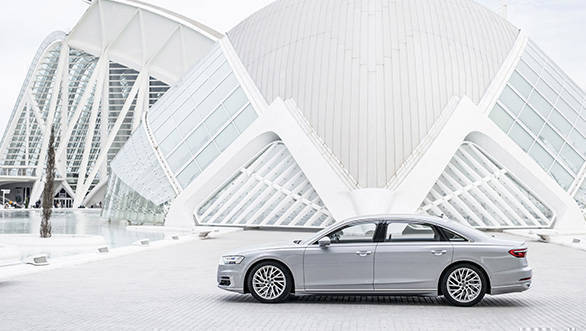 Despite its 5+ meter length, the Parking Pilot and Remote Parking Pilot programs make parking the car in tight spaces a child's play
Despite its 5+ meter length, the Parking Pilot and Remote Parking Pilot programs make parking the car in tight spaces a child's play
Then there is the Garage Pilot, which makes use of an exclusive forward facing laser scanner, that gives the limousine precise dimensions of the available space in a parking garage. The parking app can then be summoned again to pull off the look-ma-no-driver trick. As we figured in our exercise, the car doesn't need to be aligned perfectly in the front of the garage to make this work as the onboard computers will make the necessary steering adjustments for the manoeuvre. Speaking of which, another slow speed assist for use in parking spaces helps the A8L autonomously brake for or steer clear of obstacles.
Intelligent suspension
As I have said before, adaptive dampers are a boon for the automotive world, giving cars the ability to stiffen or soften suspension in a wink as per requirement. The A8 takes this aspect a few of notches beyond. Using a tiny electric motor connected to each wheel via a torsion arm, the A8 gets the ability to literally lift a wheel or all the four corners of the limousine in an instant. This capability to lift up the body opens up a range of applications. For starters, the car lifts itself up to ease ingress and egress. A forward facing camera scans the roads for bumps and potholes and the motor will raise the necessary corners of the car to let the body virtually float over the undulation. This system will also negate body roll around bends or during sudden lane changes, though our closed course exercise didn't have space to demonstrate it. But that ability eliminates the need of conventional anti-roll bars.
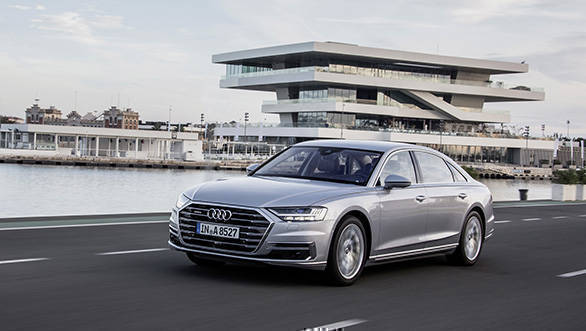 The A8L is the first production car to incorporate a laser scanner, which works in conjunction with the other sensors, camera and radars to give the car its autonomous driving capabilities and up to 40 assistance systems for highway and urban use
The A8L is the first production car to incorporate a laser scanner, which works in conjunction with the other sensors, camera and radars to give the car its autonomous driving capabilities and up to 40 assistance systems for highway and urban use
The system works magically at isolating the cabin of the road imperfections and since it doesn't use radar in its operation I would want to see it come to India. What uses radars, scanners and sensors though is an active side impact protection system which can raise the car by up to three inches on the side that is about to get t-boned. The lift helps distribute the impact force through the cross members of the chassis and the flooring, thereby reducing damage to the occupants. Audi says that most side-on collisions happen at low speeds so the chances of the limo turning turtle due to this system are zilch.
Rear axle steering
Rear axle steering is the favourite new toy in the sportcar world, but has its benefits for limos like the A8 too. The rear wheels can steer up to five degrees, giving it a tighter turning radius at slow speeds or better stability and reduced understeer at higher speeds. The variable ratio steering system that works in conjunction with the rear axle steering, seems over-assisted most of the time. But the intent of this car isn't to go carving corners.
The drivetrains
The engine line-up does suggest otherwise though. At the baseline are two 3.0 turbo V6 engines - a 286PS/600Nm diesel and a 340PS/500Nm petrol. Next is a 4.0l twin-turbo V8 good for 460PS and 660Nm. The flagship as always is a W12 with an output of 585PS and 800Nm. Audi's global and Indian arms are still at the deciding stage of which engines could be offered in our market. We sampled the 3.0 V6 petrol which we believe will be a popular choice here at home. The refinement levels of the motor are as up to date as the rest of the tech in the car and unlike the more vocal V8 and W12 models this variant doesn't need active noise cancellation in the cabin. Our drive in the A8L 55 TFSI, as it's called, was restricted mainly to narrow B-roads and brief stretches of speed restricted highways in Spain. The torquey engine and the lighter body made of steel, aluminium, carbon and magnesium, build up speed quickly and gracefully. It's a car designed for the autobahn, but feels just as natural in the city environment. It is mated to an eight speed ZF transmission that is as quick and precise as you would expect in an Audi flagship. It feeds power to the quattro all-wheel-drive system that is standard across the range.
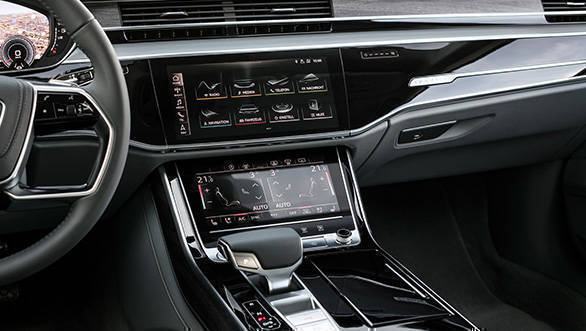 Three displays dominate the dashboard fascia - the virtual cockpit digital instrumentation, the fully customisable infotainment interface and a touch panel control for the A/C, which also doubles us as a text input screen.
Three displays dominate the dashboard fascia - the virtual cockpit digital instrumentation, the fully customisable infotainment interface and a touch panel control for the A/C, which also doubles us as a text input screen.
Irrespective of the engine you choose, there is a certain degree of hybridisation onboard. A belt driven alternator/starter provides hybrid assistance and helps the engine reach its optimum operating speed earlier to improve fuel efficiency. During highway cruises, it also helps the car coast for up to 40s, prompting the driver to lift their foot off the accelerator. The system adds 9PS of assistance in such scenarios and up to 16PS during energy recuperation. More importantly, it powers the new 48V electrical system which provides the energy required for all the active components and supports a 12V sub-system that powers the conventional electrical systems. To that effect then, the configuration is the opposite of systems we have witnessed in the Bentley Bentayga and the Audi SQ7 which have a 12V-main and 48V-subsystem configuration.
Design
While the science under the hood makes the A8 remarkable from a technical standpoint, the art that defines its form is noteworthy too. Though it has hints of the A5 and the Q7 in its finer details, the A8 shows a new design direction for the future Audi cars - one that will give them chiseled bodywork and sleeker details. The A8, now taller and longer than the outgoing car, previews the new shapes for the headlamps and tail lamps as well. The latter also makes the rear look sci-fi with its seamless LED strip highlighting the width of the car and OLED ornamentation taking the design a class above the rest. Audi assures us that despite their wafer-thin design, these OLEDs have the same life and luminance as the conventional LEDs.
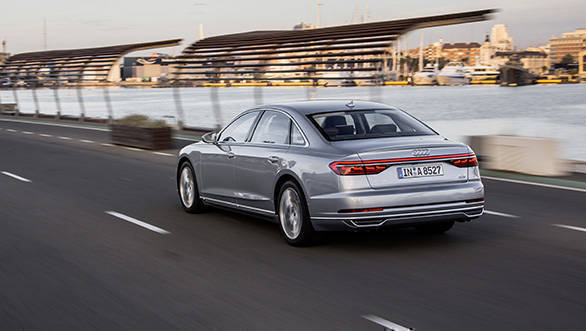 The prettiest angle on the new A8L is the rear, which gets a seamless LED strip that highlights the width of the car and it is complemented by the ornamentation of wafer-thin OLEDs in taillight units
The prettiest angle on the new A8L is the rear, which gets a seamless LED strip that highlights the width of the car and it is complemented by the ornamentation of wafer-thin OLEDs in taillight units
The lighting elements have lovely animations on startup and shut down, while a tasteful use of chrome and metallic body colours give the limousine its sheen. None of it is tacky or bling. The form and the shape of the A8 is unmistakably Audi and yet so distinctive, breaking away from the overt emphasis on familial connections that are fast becoming a tradition in the automotive world.
Cabin
Audi's obsession with minimalism gives the cabin an evolutionary design and the same obsession is now responsible for reducing switchgear clutter. The dashboard fascia and the centre console are now dominated by three crisp screens - the digital instrumentation, a 10.1 inch touchscreen infotainment system and a touchscreen control centre stacked underneath it. Unlike the S-Class, the infotainment isn't in line with instrumentation, which is fine by me for the head-up display provides all the valuable information needed and also because onlookers don't need to know what my music preference is. Furthermore, the touchscreen displays get haptic feedback, so once you customise the layout of all the control tiles and get used to it, you won't have to get your eyes off the road often to make the right selections. Since the system needs a dab than just a gentle touch, it needs getting used to. Honestly, that's your chauffeur's look out.
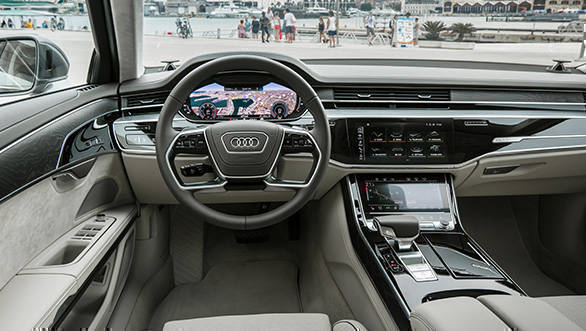 nVidia processors power the infotainment and are 50 times faster than their predecessors in the third-gen A8
nVidia processors power the infotainment and are 50 times faster than their predecessors in the third-gen A8
Though the design of the cabin may not seem as flamboyant as the rivals, the exquisite materials and craftsmanship make the investment worthwhile. While open pore ash-wood is now becoming common in this class of cars, I particularly like the feel and the texture of the leather upholstery. Despite having a marginally smaller wheelbase than the S and the 7er, there is acres of space in here.
A massage, seat ventilation and a certain degree of recline can be enjoyed in all the four seats. But the boss seat can be specced with a foot-massager as well. A small tablet - more bespoke and premium in feel than the Samsung unit in the 7-Series - provides controls for the infotainment, seat functions and the window blinds. Whether you want to take your work to the car or simply call it a day and relax in the lap of luxury, finding a comfortable posture in the back seat isn't a task. And no matter who is driving the car - the chauffeur or all the technology under the skin, the boss seat is the best place to enjoy the new A8.
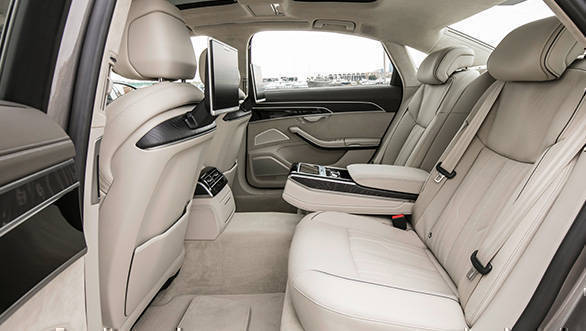 All the tech of the Audi is masked under layers of exquisite materials and top-notch craftsmanship. Though a tad bit smaller on wheelbase than the S-Class and the 7 Series, the cabin space is plush
All the tech of the Audi is masked under layers of exquisite materials and top-notch craftsmanship. Though a tad bit smaller on wheelbase than the S-Class and the 7 Series, the cabin space is plush
Speaking of which, the reason we couldn't experience the autonomous driving technology out on the road is because of legislation road blocks. While the technology is ready and incorporated, the governments around the world are yet to give it a go ahead and sanction this level of artificial intelligence out in the open. I also expect that this kind of technology will also polarise people - those who are for or against self-driving cars. But the bottom line is, this is the future of automobiles and that new era begins now.
2018 Audi A8L 55 TFSI
Type: 3.0 V6 turbo-petrol
Max power: 340PS@5000-6400rpm
Max torque: 500Nm@1370-4500rpm
LxWxH (mm): 5302x1945x1488
Price: Rs1.4 - 1.6 crore (estimated)
+ New-age assistance systems, ride quality
- Radar guided systems unlikely for India
Starts Rs 1.29 Crore
2995cc
Automatic
340
500
-NA-
Starts Rs 4.1 Crore
3996cc
Automatic
550
770
-NA-
